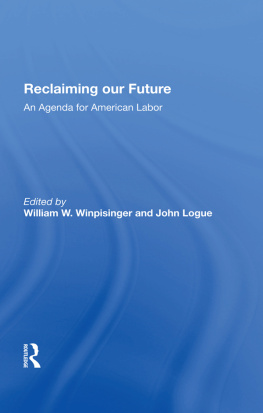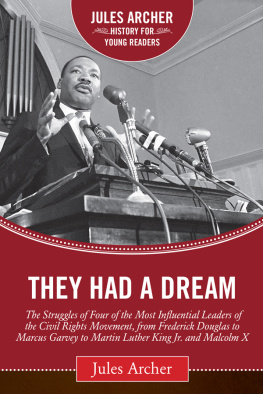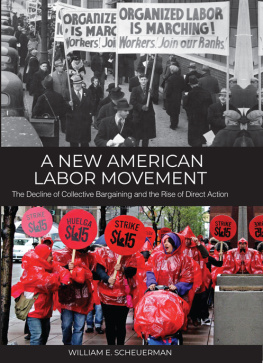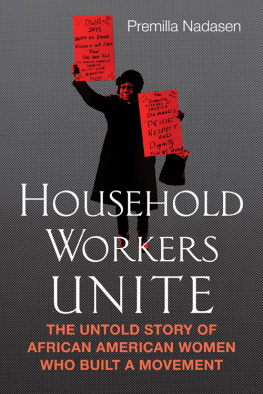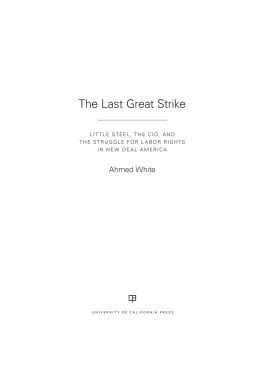First published 1989 by Westview Press
Published 2019 by Routledge
52 Vanderbilt Avenue, New York, NY 10017
2 Park Square, Milton Park, Abingdon, Oxon OX14 4RN
Routledge is an imprint of the Taylor & Francis Group, an informa business
Copyright 1989 Taylor & Francis
All rights reserved. No part of this book may be reprinted or reproduced or utilised in any form or by any electronic, mechanical, or other means, now known or hereafter invented, including photocopying and recording, or in any information storage or retrieval system, without permission in writing from the publishers.
Notice:
Product or corporate names may be trademarks or registered trademarks, and are used only for identification and explanation without intent to infringe.
Library of Congress Cataloging-in-Publication Data
Winpisinger, William W.
Reclaiming our future: an agenda for American labor / William W.
Winpisinger; edited by John Logue; with a foreword by Edward M.
Kennedy.
p. cm.
1. Working classUnited StatesPolitical activity. 2. United
StatesEconomic policy1981- . I. Logue, John, 1947
II. Title.
HD8076.W56 1989
322.20973dc20
89-9121
CIP
ISBN 13: 978-0-367-28520-3
Senator Edward M. Kennedy
From the workplace, to corporate boardrooms, to the Congress, and to the great international chambers where world leaders struggle to make peace, William Winpisinger has left his mark on every important battle of our time. He has challenged all of us to think beyond todays tasks and to confront the larger issues that will shape our nations future. And throughout it all, he has kept his eye resolutely on the goal of a society in which each of us has an opportunity to grow, to prosper, and to leave our mark.
Wimpy became president of the International Association of Machinists at a time of extraordinary turmoil within the labor movement and the American economy. It would have been easy, and understandable, for him to lower his sights and narrow his focus, as so many did. That never happened. Whatever the battlefor safer workplaces, for a healthier environment, for corporate accountability, for equal rights for the majority who are women and civil rights for the minority who are not white, and for an end to the nuclear arms raceWimpy was always there battling in the trenches, urging us to move forward. He reflects and extends the best and most glorious tradition of the American labor movement-a movement fully engaged in every aspect of our civic, economic and political life. Like Eugene Debs, Walter Reuther, and Jerry Wurf, he has left his mark on each of us even if we never carried a union card.
Reclaiming Our Future: An Agenda for American Labor recounts these historic struggles, and the agenda it describes is truly one for the entire nation and our common future. And it is no small agenda.
Wimpy begins, as all progressives must, with the economy, for he understands that a sound economy is Americas most important social program. The economy that he describes has undergone vast changes in recent years: Globe-girdling corporations move money and jobs around like pieces on a Monopoly board, technologies change so rapidly that industries become obsolete almost overnight, and competitors now are scattered all over the globe, not just across our country. Adapting to this transformation of the world economy is surely the most important challenge that we face in the 1990sand the most important message of this book is that while we must adapt, we must never lose sight of our goals. Decent jobs in safe workplaces, paying fair wagesthese are the priorities that have animated the American labor movement from its very inceptionand Wimpy never lets us forget them.
But for me his singular contribution goes beyond these aspirations. He has always insisted, as he does again in this volume, that it is not enough to merely make products, reap profits, or earn wages; we must measure ourselves by whether or not the things we produce enrich the human condition and improve the world which we will leave to our children. I can think of no one who better represents the powerful biblical injunction that Ye shall turn swords into plowshares and spears into pruning hooks. For Wimpy, this has meant a tireless campaign to eliminate the excesses in our military spending and turn our attention to meeting fundamental human needs in such areas as health care, education, housing, and the production of safe and inexpensive energy.
In the concluding chapters, Wimpy turns to another of his distinctive themes. He reminds us that wherever we work, we have another job. That job, simply put, is politics. The IAM, under Wimpys leadership, has helped transform our political landscape. His support for grass-roots organizations has helped change neighborhoods throughout our land and has infused our political system with a new generation of citizen activists from every walk of life.
As I reflect on the real message of Wimpys support for groups like the Citizen Labor Energy Coalition, Citizen Action, and the Rainbow Coalition, I am struck by two points. First is the simple but powerful proposition that the interests of the American labor movement are not separate from or at odds with those of the broader community. His insistence on pursuing a common agenda has helped bring us together and made us stronger.
Second, Wimpy reminds us that passing political victories are worth little if they are achieved at the sacrifice of principle. As he recounts, this has sometimes made him a lonely figure, but it has never stopped him or caused him to pull his punches. In this book, he returns again and again to the issues and the concerns that have driven him throughout his career. This volume is no mere memoir. It is a guide and an instruction manual for those of us who will, with Wimpys help, continue to struggle to redeem the American dream.
In my campaign for president in 1980, Wimpy was at my side from the first moment and he never left. For me, he was then, he has always been, and he remains today, a pillar of strength and insight.
In these pages, Wimpy carries on the work that brought us together and that we still share. He calls on us to face our problems squarely and to remember who we are and where we are going. Above all, he reminds us that we must join hands to reach our destination.
Introduction
William Winpisinger and the American labor movement
John Logue
The first act of William W. Winpisingers tenure as president of the International Association of Machinists and Aerospace Workers (IAM) set the stage for the next dozen years: he convened his initial staff meeting at a minute past midnight, just seconds after he took office on July 1, 1977. Things were going to be different, he told the staff members. I dont mean to be poetic, he said, but you might liken this to a new dawn.
As a Newsweek writer commented laconically later (October 23, 1978), Winpisingers dawn came up like thunder.
Poetic, prophetic, and occasionally profane, William W. Winpisinger has been the most outspoken and most quotable American labor leader of this generation. He has variously been described in the press as everything from a loud mouth automechanic and labors last angry man to merely being brash and skilled at capturing the spotlight. No one has ever described him as mincing his words or pulling his punches.

